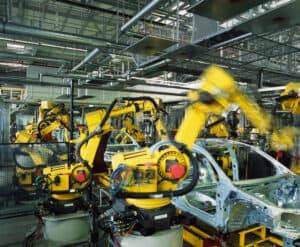
Smart technologies are emerging as a powerful simplifying force amid the complexities of pursuing sustainability goals.
The automotive industry is at a crossroads. Modern vehicles are engineering marvels but pose challenges in manufacturing and management. As the industry embraces sustainability initiatives and many manufacturers explore the circular economy model, balancing environmental responsibility with economic progress is a major goal.
At the heart of this transformation lies smart manufacturing, a technological approach prioritizing data-driven precision, automation, and process efficiency. Let’s explore how smart manufacturing is the key to unraveling the web of complexity—from customization demands to supply chain intricacies to the new era of sustainability.
Smart manufacturing: the driving force
The automotive industry is poised to navigate and thrive in this era of automotive complexity. Smart manufacturing, also called Industry 4.0, plays a crucial role in addressing the complex challenges faced by the modern automotive industry. Here are several ways it’s mitigating challenges.
- Data-driven decision-making: Smart manufacturing relies heavily on data collection from the sensors and devices installed throughout production. Manufacturers use this data to monitor and analyze every aspect of production in ways they never could before and in near real time. This is enabling a new wave of optimization for efficiency and quality simultaneously.
- Predictive maintenance: In manufacturing settings, unplanned (and even sometimes planned) downtime is costly and can put production schedules behind. Smart manufacturing systems can predict when machinery is likely to fail based on sensor data and plan the least intrusive path to getting things fixed. This minimizes disruptive downtime.
- Quality control and traceability: These systems also track and trace individual components throughout the production process, providing a history of each part. This ensures product quality, rapid identification, and fast resolution of any quality issues.
- Customization and flexibility: Modern automotive customers increasingly demand greater customization choices. Smart manufacturing can adapt to these demands by leveraging flexible production lines that easily switch between models and configurations without lengthy retooling.
- Supply chain optimization: Smart manufacturing extends beyond the factory floor. Advanced analytics, predictive algorithms, and digital twins can optimize inventory levels, improve demand forecasting, and strengthen supplier relationships, reducing costs and lead times.
- Energy efficiency: Smart manufacturing incorporates energy-efficient practices like optimizing machine operation schedules and reducing consumption outside production hours. This helps to lower overall operating costs and aligns with sustainability goals.
- Collaborative robots: Cobots work alongside humans, assisting with repetitive, dangerous, and physically demanding tasks. This improves productivity while prioritizing worker safety.
- Remote monitoring and management: Manufacturers can access real-time data and control production lines from anywhere, which is especially useful for global automotive companies with multiple facilities trying to manage sustainability goals.
Smart manufacturing: fulfilling sustainability goals
Smart manufacturing is not only a driver of operational efficiency but also a linchpin in achieving sustainability goals. Leveraging technologies such as artificial intelligence (AI), machine learning, and automation, auto manufacturers are attaining unprecedented levels of precision and sustainability in their operations.
Digital Twins for Sustainable Design
One crucial aspect of this transformation is the concept of digital twins. These digital counterparts represent real-world products, including entire automobiles, encompassing software, mechanics, and behavior. Digital twins are pivotal in replicating the production process and identifying potential complications or failures. For instance:
- Sustainable Product Testing: Automotive manufacturers employ digital twins to experiment with different designs that optimize product performance while minimizing environmental impacts. They can simulate various conditions, such as a car tire’s behavior in diverse weather conditions, with sustainability in mind.
- Predictive Maintenance for Sustainability: Predictive maintenance, powered by digital twins, forecasts when automotive components might break down, allowing companies to schedule maintenance preemptively. This predictive capability minimizes disruptions, reduces resource consumption, and enhances sustainability.
- Continuous Performance Monitoring: Continuously collecting and analyzing data on replicated vehicles, digital twins provide critical insights. Companies like Tesla create digital twins for vehicles to ensure they perform as intended and make necessary updates to enhance performance and sustainability.
These smart technologies drive efficiency and empower manufacturers to meet sustainability goals and reduce their environmental footprint. In this era of heightened environmental awareness, smart manufacturing is not merely a technological leap but also a significant step toward a more sustainable future in the automotive industry.
The adoption of digital twins is certainly on the rise. North America is leading the way, accounting for approximately 38% of the global digital twin market in 2021. This market is expected to reach a staggering US $155.83 billion by 2030, with the automotive sector experiencing the fastest growth rate percentage, driven by the surge in electric vehicles and digital twin technology adoption.
See also: Smart Manufacturing: Melding Digital and Physical Worlds
Embracing the circular economy with tech
The circular economy model challenges traditional linear approaches, emphasizing the reclamation and recycling of components. It’s a paradigm shift driven by both environmental responsibility and economic gain, and technology is the linchpin.
Many industries, including automakers, face increased regulatory and taxation burdens related to emissions and landfill waste. The circular economy approach aligns with global environmental goals, such as those outlined in the Paris Climate Agreement. Beyond its environmental merits, adopting a circular economy approach significantly improves profitability, as recognized by the World Economic Forum.
Several automakers are voluntarily embracing circular economy principles. Renault, for instance, has announced an initiative called “The Future is NEUTRAL.” This initiative aims to achieve closed-loop circularity across the vehicle lifecycle, from procuring raw materials to production, use, and scrapping. Renault envisions becoming carbon-negative in automotive production by 2030, strongly focusing on recycling and sustainability practices.
Stellantis has also launched its circular economy business unit, intending to become carbon neutral by 2038. The company is striving to generate significant revenue from this unit and plans to establish a “Circular Economy Hub” in Italy.
Volkswagen, Ford, and other major automakers have set material recycling targets and are exploring closed-loop systems for sustainable vehicle production.
The Role of Smart Technologies
These smart technologies are instrumental in making the circular economy model a reality in auto manufacturing. Consider some of the key aspects and technologies that auto manufacturers are employing:
- Digital Twins: Digital twins play a crucial role in replicating real-world products and processes, allowing manufacturers to identify potential complications, optimize product performance, and predict maintenance needs.
- Internet of Things (IoT): IoT systems enable automotive devices to collect performance data, which is then processed in the cloud to assess risks and maintenance requirements, allowing manufacturers to address issues before they lead to breakdowns.
- AI in Supply Chain: AI-powered supply chains can adapt to unforeseen issues, reducing forecasting errors and enabling “smart factories” that rely on self-improving systems for more efficient manufacturing.
- Machine Learning: Machine learning and AI systems aid manufacturers in detecting anomalies, improving designs, and predicting market forecasts, contributing to more appealing and innovative designs.
- AI Customer Experiences: Automotive manufacturers increasingly rely on artificial intelligence to enhance customer experiences, offering virtual sales assistants and tailored insights based on past interactions.
As the automotive industry continues to expand, manufacturers must embrace the increasing use of AI, machine learning, and automation. “Smart” manufacturing spans the entire production lifecycle, from supply chain management to customer services. Staying up-to-date with these rapidly progressing digitalization and AI trends is essential for manufacturers aiming to remain competitive in this transformative landscape.
Smart Manufacturing’s Simplifying Impact on Sustainability
Smart technologies are emerging as a powerful simplifying force amid the complexities of pursuing sustainability goals. Technologies like artificial intelligence, digital twins, and the Internet of Things are enhancing operational efficiency and providing clear pathways to achieving sustainability objectives. Smart manufacturing addresses modern auto complexity challenges and enables car manufacturers to shift toward sustainability.
Additional Resources

Drive production excellence with intelligent manufacturing
The automotive industry is facing unprecedented challenges, with rapid change and intense pressure to meet the demands of climate change, regulations, and consumers. Download Now

Modernize automotive factories with Siemens Smart Manufacturing solutions
Discover how automakers can transform their business with Smart Manufacturing solutions using state-of-the-art hardware and software to modernize production lines. Watch Now

Virtual Manufacturing Development for the Automotive Industry
Companies in the automotive industry are pushing to develop the next generation of autonomous, electric, connected, and shared vehicles. View Now









